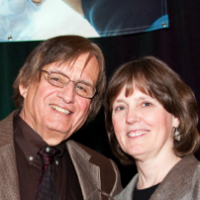Visions 2025 Initiative
The Visions 2025 initiative is intended to inspire the computing community to envision future trends and opportunities in computing research. Where is the computing field going over the next 10-15 years? What are potential opportunities, disruptive trends, and blind spots? Are there new questions and directions that deserve greater attention by the research community and new investments in computing research?
To answer these questions, a steering group of computing leaders drawn from the National Science Foundation (NSF) Computer and Information Science and Engineering Directorate Advisory Committee (CISE AC) and the Computing Community Consortium (CCC) are planning a set of workshops to catalyze cross-computing and cross-disciplinary discussions.
Instead of attempting to cover every area of computing research, the steering committee has chosen three topics to focus on first, with the intention of looking at each from multiple perspectives provided by a diverse selection of participants in the workshops, and with the intention that there will be future workshops on additional topics.
The workshops will be held in the spring of 2014 and are briefly outlined below.
Interfacing With the Computers All Around Us
Computers are increasingly ubiquitous, from smart phones and sensors, to wearable electronics and embedded medical devices, to conventional tablets, laptops, and server racks. In this workshop, we will bring together researchers at the cutting edge of pervasive computing to look beyond the horizon at the technological innovations that could radically change how computers interface with people and the world around them.
In particular, the workshop will cover the growing challenges and promising technological trends in how people will interact with computing around them in efficient, correct and humanly pleasing manners. Many computing devices will be interacting with each other without humans in the loop, thus, the workshop will also explore interactions involving a swarm of machines. Finally, ubiquitous computing will open new frontiers in how people interact with people and will empower communities to accomplish bigger and more complex tasks.
Planning team includes:
- Limor Fix, Intel, retired, limorfix@hotmail.com
- Jennifer Rexford, Princeton, jrex@cs.princeton.edu
New Renaissance of Indy Manufacturing: Programmable Matter and Things
There is a major transformation happening in the technology landscape – a transformation whose precedent lies less in the cyclical tides of innovation seen over 50 years of Moore’s Law, and more in the upheavals seen in the introduction of major transformative technologies such as the printing press, the programmable loom, and the computer itself. This new renaissance, underpinned by “indy manufacturing”, will change the way that most items are designed, manufactured, and delivered.
Indy manufacturing has at its root the confluence of three major technological trends: cheap and fast creation of matter in new forms, on-demand electronics, and programmable intelligence in every object. The creativity and change unleashed could fundamentally change how society operates with a return to craftsmanship with precision as well as the ability to mass customize/produce every product. Further, there are also new distribution channels that are emerging and a democratization of capital to fund projects.
Planning team includes:
- David Culler, University of California at Berkeley, culler@eecs.berkeley.edu
- James Landay, Cornell, landay@cornell.edu
- Prabal Dutta, University of Michigan, prabal@eecs.umich.edu
Computing and the Smart World
Advances in computer science are necessary if we are to tackle virtually any national or global challenge: health care, transportation, education, scientific discovery, energy efficiency, national security, etc. – and doing so will also change computer science.
Many of these advances will involve using massive amounts of data and advanced analytic techniques to “make the world smart”; continuous instrumentation of the human body, intelligent vehicles and transportation systems, adaptive personalized online education, data-intensive science, the smart home and grid, dramatically improved intelligence for national security, etc.
These workshops are still in the planning stages. Opportunities to participate will be extended to a broad spectrum of the computing community. Summaries of the workshops will be disseminated in the CCC Blog and discussed at Snowbird, 2014.
Planning team includes:
- Beth Mynatt, Georgia Tech, mynatt@cc.gatech.edu
- Ed Lazowska, University of Washington, lazowska@cs.washington.edu









